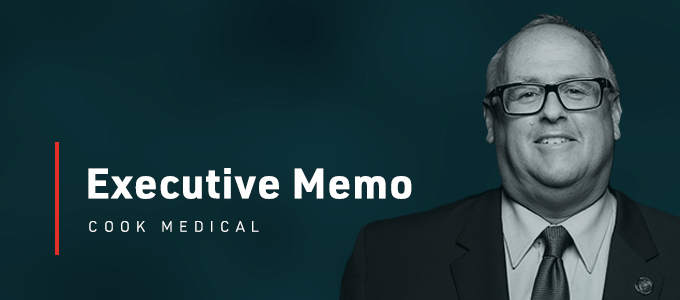It’s Crunch Time for Transportation Solutions in 2021 – Time for State Leaders to Take a Bold Cue from Business

Editor’s Note: The advancement this week of a long-sought federal infrastructure investment package by senators on Capitol Hill begs an important question for policymakers here in our state: Are North Carolina’s leaders prepared to take bold, bipartisan action this session to modernize our state-supported infrastructure? To spotlight the need for state leaders to revamp our approach to funding one of North Carolina’s foundational infrastructure assets – our transportation network – we are grateful to welcome a guest voice from the business community in this week’s Executive Memo: Scott Sewell, vice president of external affairs and corporate compliance officer at Cook Medical. We hope you share this message widely with others in your network.
Job creators understand all too well the importance of eliminating unnecessary roadblocks to our growth, both within and beyond our companies. Unfortunately, there is one major roadblock that threatens to impede the growth of virtually every company that operates in North Carolina and undermine our economic relaunch to boot: our continued reliance on 20th century solutions to fund a 21st century transportation network.
The good news is that North Carolina’s leaders have an opportunity right now, in 2021, to position our state as a leader in a new era of transportation policy. As states begin to incorporate the lessons of the past year and a half and strategically plan for the next decade and beyond, many are recognizing the need to modernize their transportation revenue streams and explore novel alternatives to outdated funding mechanisms like motor fuels taxes. Thanks in large part to the work of the business community over the past year, it’s a conversation that’s gaining heavy traction here in North Carolina.
At Cook Medical, we see the negative impacts on our operations from poorly funded and poorly maintained transportation infrastructure, just as we see the benefits of harnessing transportation assets that are well-funded and well-connected. As a leading developer and supplier of medical devices, it’s our job to support an industry that’s vital to the health of our communities. When transportation challenges emerge locally, they translate to logistical hurdles for our business in that area. If those problems aren’t solved, they can very quickly multiply to produce major logistical headaches that are far bigger than the sum of their parts – and that can complicate our efforts to fulfill our customers’ most essential needs.
Securing a 21st century statewide transportation funding strategy will ensure our state can address infrastructure problems before they grow out of hand and impede business and commerce. In a fast-changing and highly competitive global economy, it will also help us to fully leverage our state’s natural position as an East Coast logistics hub and capitalize on the targeted investments our leaders have already made to bolster important network assets (like the recently enhanced cold storage capacity at our ports that is fueling growth in our agriculture and life sciences sectors). Of course, as the NC Chamber explains in their ongoing #SafeTravelsNC social media campaign, a modernized transportation funding strategy will also mean safer roadways, reduced vehicle operating costs, and greater economic opportunities for families across our state.
Through the advocacy of job creators on the NC Chamber-led Destination 2030 Coalition – of which Cook Medical was an early supporter after its launch last summer – and the work of groups like the NC FIRST Commission, members of the North Carolina General Assembly are now widely engaged in a bipartisan, bicameral conversation on the need to update our state’s transportation funding model. Many solutions have emerged as part of these discussions, from measures that shift revenue from the General Fund to the Highway Fund to those that can capture a more robust, more equitable stream of funding from electric and hybrid vehicles.
It’s now up to elected officials in the General Assembly to show bold, bipartisan leadership and negotiate a politically feasible path forward on this issue of foundational importance for North Carolina. You can help ensure our leaders begin activating modernized transportation solutions this session by contacting legislators in your network and letting them know that transportation matters to your business – and that a sustainably funded transportation network must be a priority for our state.
I thank Mark Coggins, director of government affairs at the NC Chamber, and Jake Cashion, chair of the Destination 2030 Coalition, for their leadership on this issue. I also thank every individual and organization who has helped to elevate the importance of modernized transportation solutions to our state’s leaders. On an issue that has remained a persistent challenge for North Carolina, the business community’s commitment to addressing our outdated transportation funding model is starting to pay off.
As we enter the waning weeks of the 2021 legislative session, let’s give our elected leaders the encouragement they need to begin dismantling this unneeded roadblock on our future growth and set North Carolina firmly on a course to a 21st century transportation strategy.
Sincerely,
Scott Sewell
Vice President, External Affairs, Corporate Compliance Officer
Cook Medical